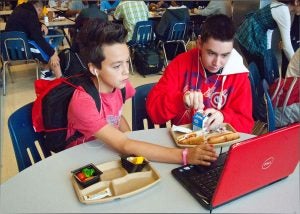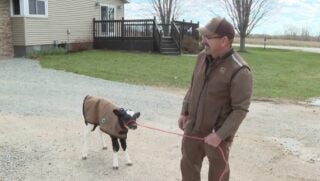Milk does a body good — but not if the milk ends up in the trash
In December 2010, then-President Barack Obama passed the Healthy, Hunger Free Kids Act, which brought big changes to school lunch tables. This act gave the U.S. Department of Agriculture the power to set new standards for school lunch programs nationwide — and it provided more funding to schools in order to further reduce the cost of lunches for families in need. It also set up new nutritional guidelines for meals, which bans certain foods from appearing in schools.
The act mandates that kids purchasing school lunches must have more fruits and vegetables, fewer refined grains, less fat, less sodium, and no access to certain types of milk. Under the Healthy, Hunger Free Kids Act, only fat-free flavored milk, fat-free white, and 1% white milk is allowed.
This was meant to ensure that kids get healthy lunches. But it hasn’t worked out as planned.

Food waste in school cafeterias is a huge problem. Although it doesn’t appear that food waste has increased since the implementation of the act, it has changed. The Food Waste Warriors conducted a study across eight states, 46 schools, and nine major cities in the U.S. What they found was that as much as 45 million gallons of milk is wasted in schools annually across the country.
The 13 essential nutrients in milk do no good when they end up in the trash!
97milk is an organization that is fighting to get whole fat milk allowed into schools again. They aren’t fighting to get it back into schools just because it tastes better, but because it could have huge positive impacts on kids in school.
97milk is made up of five board members, and they have been active in the dairy industry since 2019. Jackie Behr, a dairy enthusiast, nutritionist, and 97milk’s marketing manager explained that 97milk is about sharing milk nutrition facts and educating communities on dairy farming.
On their website, they share scientific articles, milk facts, and messages for farmers to share with their communities. They share that many nutrients in milk and vegetables are fat soluble, meaning that you need fat to utilize them. They also post respected articles, such as Reuben Castaneda’s peer-reviewed article on the healthiest of milk options.
Behr says that they don’t want to get rid of reduced-fat milk; they want whole milk to be an option. Behr found that many parents were surprised that whole milk wasn’t an option in schools. Have we lost an entire generation of milk drinkers simply because whole milk isn’t offered to children?

Sherry Bunting writes in her 2019 historical overview of how our nation got to where school lunches are today: “The school lunch and later breakfast programs began when the military in the 1940s saw malnutrition as a national security issue among recruits. … Now our military says recruits are too obese to serve. We are facing a new national security threat. This is no joke.”
97milk believes that if whole milk is offered to kids in school, consumption will rise, and the cravings for sugary foods and drinks will lower. Grabbing whole fat milk is better than grabbing sugary drinks any day!
When I was in high school I would bring chocolate milk to local 5k races to hand out at the finish line. I handed out hundreds of chocolate milk cartons to young runners throughout my years. Oftentimes people would ask me where they could buy that milk. They’d tell me, “I never drink the milk at school, but this actually tastes good!”
As a dairy producer, it hurts to hear so many kids tell you that they don’t like milk. In reality, most everybody likes milk, they just don’t like it fat free. Re-introducing whole milk into schools would undoubtedly change the way people consume dairy in the U.S.
To stay updated on 97milk or their bill 832 – Whole Milk for Healthy Kids Act of 2019, you can follow 97milk on their website or on Facebook.
Elizabeth Maslyn is a Cornell University student pursuing a career in the dairy industry. Her passion for agriculture has driven her desire to learn more, and let the voices of our farmers be heard.



